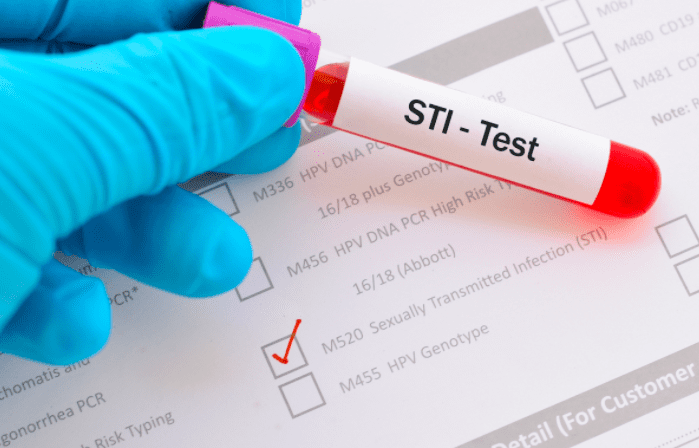Kiwi woman Sarah thought her date was something special – but he gave her something she never anticipated. Here, she clears up some of the stigma surrounding STI’s and shares the real story of what it’s like to contract a sexually transmitted infection. Turns out, herpes is MUCH more common than you’d think – and we need to start talking about it.
This wasn’t my first rodeo; the dull ache and constant need to pee were all too familiar.
“I feel like I’ve been punched in the vagina,” I announced to the poor pharmacist. She looked alarmed. “Oh goodness,” she replied as she handed over the prescription for my rapidly worsening bladder infection. “Perhaps some thrush cream too? Just in case?”
But nothing was working. This was next level discomfort.
That night, after pulling out a torch and mirror and hitting Google, I discovered something else was going on down there. Bladder infections do not cause ulcers on your fanny.
I was determined to convince my doctor that despite the sex I’d had four days earlier with someone I thought was going to be ‘someone special’, this couldn’t be an STI. Because surely 2020 couldn’t deliver any more surprises.
I was sitting in a mall food court when the message from my doctor arrived a week later. ‘Your swab has come back positive for genital herpes’. SURPRISE!!
I started crying into my beef rendang. All I could think was, ‘who’s ever going to love me now’.

I contacted Logan (not his real name), the ill-fated swipe-right, who was kind enough to come around to talk to me. He thought I was pregnant. I thought a man with three kids would know babies don’t grow in seven days. He acted suitably mortified – enough to assure me he had no idea. He also informed me he’d had no plans to ever contact me again after we’d slept together.
With genital herpes, in my case HSV-2, the first outbreak is often the worst outbreak. It felt like peeing acid. It hurt to walk. It hurt to sit. It hurt to drive over speed bumps. Undies had to be sacrificed and tight pants were a no-go. I had shooting pain jolting into my nether regions. I had a bruised heart, overwhelming shame and felt entirely alone. I cried – pretty much every night in bed for six weeks.
I told a circle of close friends – a wonderful support network who took me out for ice cream, turned up with chocolate and assured me I was still entirely loveable. Two friends admitted they’d also been diagnosed. My sister-in-law burst out laughing (with relief); apparently my face was so serious she thought I’d been delivered a death sentence. In days to come she checked in to ask how my [insert taco emoji] was.


But the worst thing about herpes? The stigma.
We’ve got Time Magazine to thank for that. When herpes graced the cover of the August 1982 issue headlined ‘Today’s Scarlet Letter’ – it stated “frequently, herpes seems to strike nice, healthy, educated, clean-cut Caucasians of the middle and upper classes” amongst numerous other journalistic malpractices. THE HORROR. WHITE PEOPLE GET HERPES! AND NICE PEOPLE TOO! That article, published almost 40 years ago, has played a significant role in how herpes is perceived in popular culture today e.g. badly and falsely. Unlike AIDS, herpes just hasn’t managed to shake its hideous reputation.
While the odd ulcer on your fanny or phallus isn’t exactly a good time, it’s the pyscho-social impact that is most punishing.
So, here’s what you need to know:
- More than 30% of sexually active adults in NZ have genital herpes. 80% don’t know they have it because the symptoms are so mild – or they’re symptomless altogether. This means you could be passing it on willy nilly (albeit unwittingly) – pun intended.
- The average incubation period for an initial herpes infection is four days with a range of two to 12 days. Not everyone will have symptoms and only a small percentage of people have an initial outbreak.
- If someone tells you they’ve been tested for STIs and are clear, this does NOT mean they’ve been cleared of herpes. That’s because they haven’t been tested for herpes; it is simply not part of regular STI screening. Herpes can only be tested for via swab if you have symptoms. Blood tests are not a reliable diagnosis for genital herpes.
- Anyone can get herpes; it has nothing to do with being careful or the number of partners you’ve had. It’s spread through skin-to-skin contact.
- Oral antivirals are an effective treatment for the symptoms and can also reduce the chances of passing it on to partners
- There are two strains of herpes simplex virus, HSV-1 and HSV-2 causing the same symptoms and managed in the same way. HSV-1 causes ‘cold sores’ on the mouth, and up to 80% of the population has this virus. However, it may also be transmitted to the genitals through oral-genital sex (about 50% of genital herpes is caused by HSV-1). HSV-2 causes genital herpes, however is rarely spread to the mouth.
- As with many herpes viruses, (e.g. herpes zoster which causes chicken pox) it stays in the body and can recur as shingles. Herpes simplex stays in the body and occasionally reactivates causing cold sores. There is presently no cure, or vaccination, against it.
- On average men have more partners than women but a lower rate of genital herpes. This is because women’s genital skin is more susceptible to micro trauma and getting the infection.
- My doctor told me she sees one new case of genital herpes per month (and patted my arm).
At 43, and knowing what I do now, I’m kind of surprised herpes hasn’t popped up in my life before now.
The best resource I found, a source of care, reassurance and guidance was from the New Zealand Herpes Foundation – a not-for-profit organisation funded by Ministry of Health with a brilliant myth-busting website. Claire, the friendly voice at the end of the Foundation’s helpline has, for the past 30 years, been answering the calls of thousands of Kiwis blindsided by their diagnoses.
The first thing she said was “You need to know that herpes simplex is rarely a medically significant infection.”
And herein lies the problem: everyone thinks it is and yet herpes is almost unavoidable. In my experience, it really doesn’t deserve the reputation it has. I’m not by any means suggesting you shouldn’t take steps to minimise the risk (condoms absolutely can reduce it) but given that the infection exists on men anywhere across the buttocks and thighs (not to mention genitals) you’ll be wrapping him in gladwrap if you’re serious about prevention. And that gets sweaty.


I decided to ‘test the market’ and shared my diagnosis with a beautiful soul I’d started chatting to on Tinder. His response made me cry (to be fair, I was in the ‘cry every day’ phase): he said he appreciated my honesty, had huge respect for me, called me honourable and said he wanted to give me a hug. He helped lift me out of my pity party but sadly I watched him fade away over following weeks and I realised maybe I should wait a little longer before sharing next time.
It’s now February 2021, three months since my diagnosis. It’s popped back once – one tiny little dot that I would have completely missed if I hadn’t pulled out the mirror and torch again at a hint of discomfort.
I don’t think about it much at all but the world likes to remind me. I saw an HILARIOUS meme this week; apparently the new Harry Potter book is called Herpes Genitalis and the Philosopher’s Stance. Turns out that meme is actually the title of a published article from the Journal of Medical Ethics – so it is kinda witty. But if I do hear anyone joking about herpes I’ll have no qualms gently sharing that it’s an infection I have – and they could easily have too.
Logan and I are bumbling our way through a friendship. I can’t imagine I’ll ever forget him; he doesn’t realise that memories of him are indelibly stamped on my body.
I still get angry and I still get sad. I’m terrified of meeting someone I really like and watching them walk away when I share I come with added extras. But I just have to remind myself that someone, the right person, is going to see past the infection and understand that it doesn’t shape who I am. Nobody is their infection, no matter what it is.
My friends have stopped asking how my vagina is now – and I don’t ask about theirs either.
My happy ending will be when I meet that guy who takes time to learn about herpes when I share my diagnosis with him. Maybe he’ll even have HSV too. The odds are high. That’ll be when the stars align.
PS – while I haven’t been brave enough yet to put my full name and face to this story I am happy to talk to anyone who’s had a recent diagnosis and needs someone to talk to. Email [email protected] and your message will be confidentially passed along to me.

